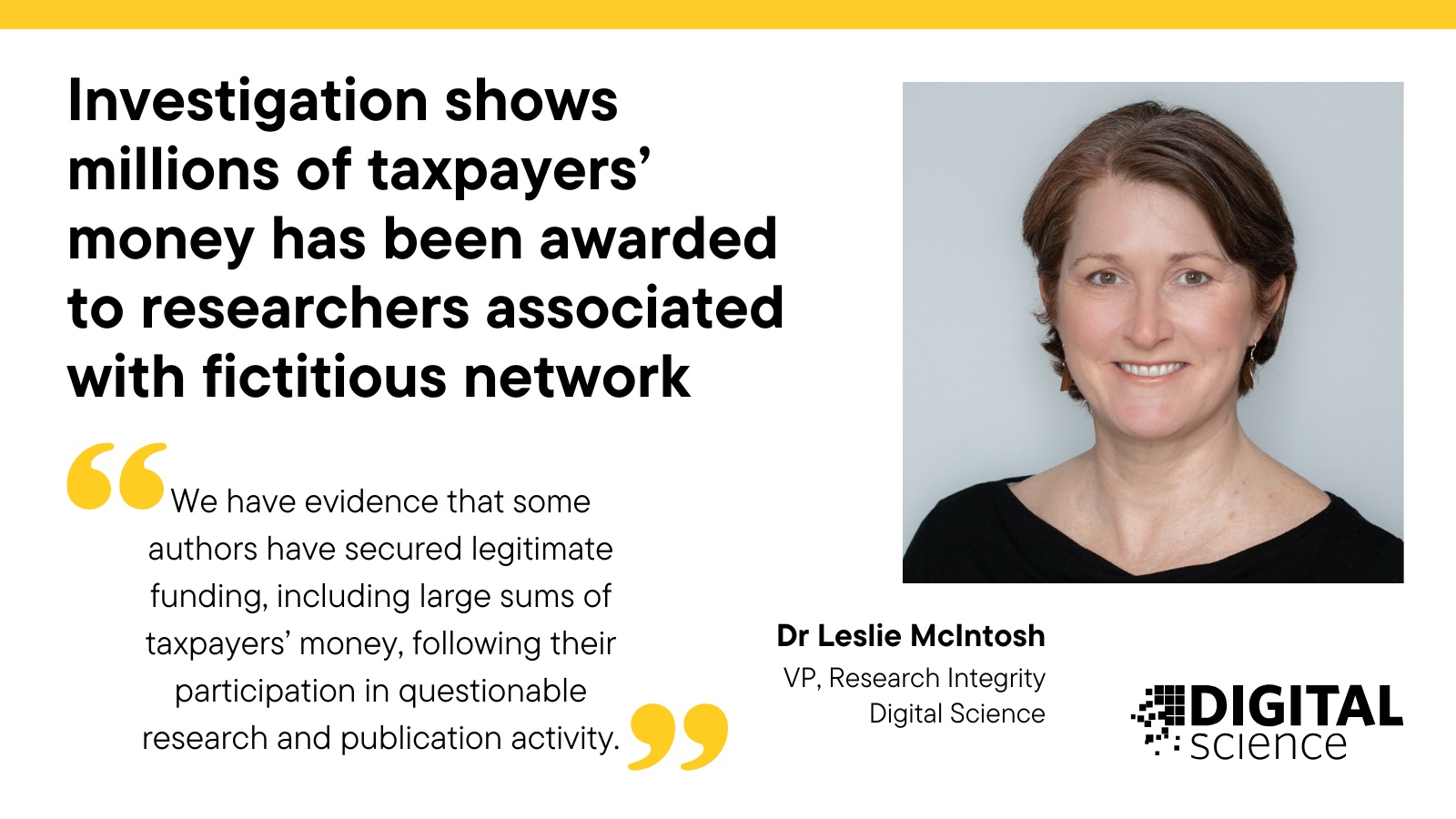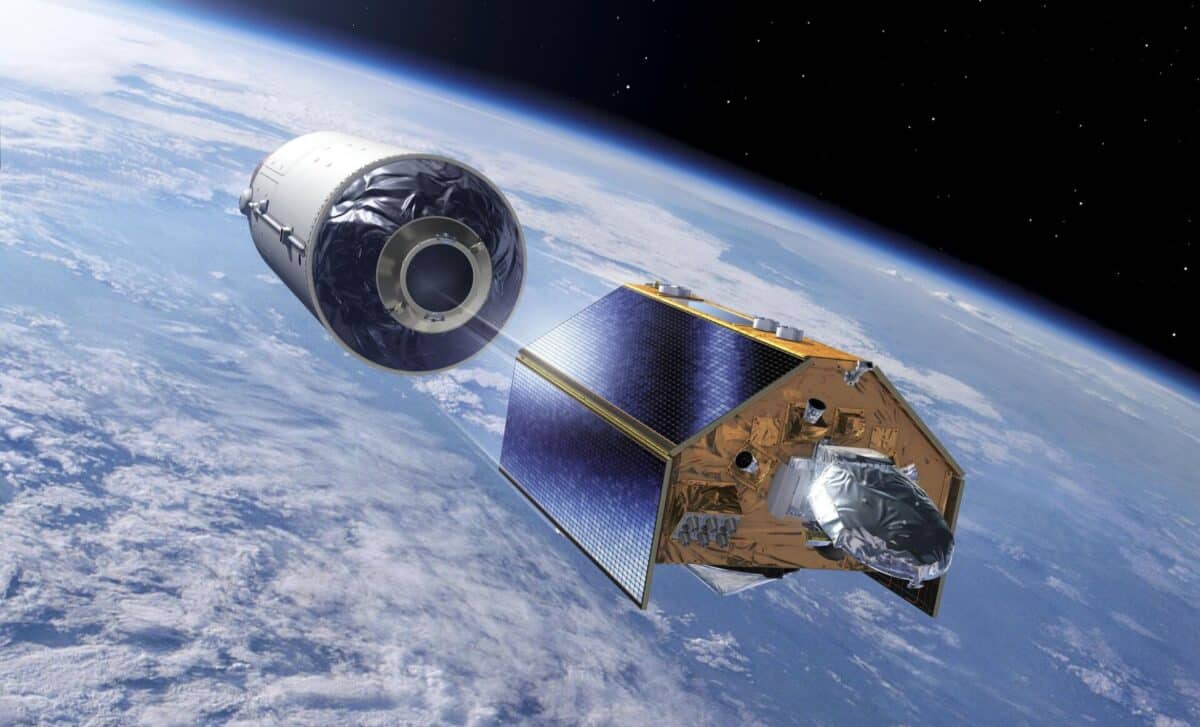Thursday, September 4, 2025 – London, UK and Chicago, USA.
Researchers associated with a fictitious research network and funding source have collectively raised millions of dollars of taxpayer money for current studies in the United States, Japan, Ireland, and other nations. This is according to research led by Digital Science’s vice president of research integrity, Dr. Leslie McIntosh.
The results of their research raise serious concerns about the lack of accountability of those involved in questionable research publications.
“This example illustrates how weaknesses in research and publishing systems can be systematically exploited, so that researchers can manipulate the system to their own advantage,” says Dr McIntosh.
Dr. McIntosh, one of the co-founders of the Forensic Scientometrics (FoSci) movement, presented her analysis at this week’s conference. 10th International Conference on Peer Review and Scientific Publication in Chicago, in a talk titled: Manufactured impact: how a non-existent research network manipulated academic publications.
While he did not name the individual researchers involved, Dr. McIntosh’s presentation focused on a group known as the Pharmakon Neuroscience Network, a non-existent body listed in more than 120 research publications between 2019 and 2022 until it was exposed as fictitious. 331 unique authors participated in these publications and were associated with 232 organizations and institutions in 40 countries.
The research network raised multiple red flags
The Pharmakon Neuroscience Network functioned as a loose collaboration of predominantly junior researchers, such as postdoctoral and PhD students, whose publications included:
- Recognitions of financing with non-verifiable organizations
- Use of questionable or unverifiable institutional affiliations
- Suspiciously large quotes in a short period of time
- Globally connected despite a young publication age
“Despite clear concerns about the legitimacy of their work, only three articles have been formally retracted to date,” says Dr. McIntosh.
Using Digital Science research solutions Dimensions and altmetricDr. McIntosh and his colleagues have followed the progress of authors connected to this network.
“Once the Pharmakon Neuroscience Network was discovered to be fake in 2022, it no longer appeared in publications, but many of the researchers associated with it continued to publish and attract significant funding for their work,” he says.
Millions in funding for current research
Of the initial 331 investigators associated with Pharmakon Neuroscience Network publications, Dr. McIntosh has established that more than 20 are currently funded as principal investigator or co-principal investigator from sources where the grant began in 2022 or later. During this time, those researchers have collectively received the equivalent of at least $6.5 million from seven countries: the United States, Japan, Ireland, France, Portugal and Croatia, and an undisclosed sum from Russia.
A researcher with more than $50 million in funding is the author of one of the Pharmakon articles. It is not clear whether he consciously participated in the network or was part of former student activity.
“Many of the researchers received grants before and after Pharmakon. This is legitimate taxpayer money that, in most cases, funds very unethical practices,” says Dr. McIntosh.
“One aspect we need more time to examine is the possibility that some of these researchers may not know that they authored papers within this network. We are still completing this work.”
Of the funded researchers, five had never received funding for their research, but following their participation in the Pharmakon Neuroscience Network they have received grants from the following sources (US dollar equivalent):
- Science Foundation of Ireland – $649,891
- Ministry of Science, Technology and Higher Education (Portugal): $538,904 in total
- Croatian Scientific Foundation – $206,681
- Russian Science Foundation – undisclosed sum
“Here we have evidence that some authors have obtained legitimate funding, including large sums of taxpayer money, following their involvement in questionable research and publication activities,” says Dr. McIntosh.
“We can assume that his publication portfolio, however obtained, helped secure this funding from legitimate sources.”
Dr McIntosh says this case has implications across the research system and emphasizes the need for stronger verification, monitoring and cooperation.
“Although most of these publications remain in circulation and have been widely cited, corrective actions have been limited. This highlights the challenge of addressing these networks once their work is integrated into the academic record,” he says.
Recommendations
Dr. McIntosh recommends the following:
- Oversight will be strengthened by requiring the use of verified institutional identifiers, such as GRID or ROR, in all publications to ensure that affiliations are legitimate and traceable.
- Transparency will be required through clearer statements of author contributions and verified funding acknowledgments, creating a more reliable and accountable record of how research is conducted and supported.
- Monitoring mechanisms should be improved by supporting the adoption of forensic scientometrics, which can detect unusual collaboration patterns or questionable authorship practices before they become systemic.
“By addressing these gaps, governments, publishers and research institutions can help protect the integrity of the research system and ensure that trust in science is maintained,” says Dr McIntosh.
See more details about this research in Dr. McIntosh’s blog post: From nefarious networks to legitimate financing.
About digital science
Digital Science is an artificial intelligence-focused technology company that delivers innovative solutions to complex challenges faced by researchers, universities, funders, industry and publishers. We work in partnership to advance global research for the benefit of society. Through our brands (Altmetric, Dimensions, Figshare, IFI CLAIMS Patent Services, metaphacts, OntoChem, Overleaf, ReadCube, Symplectic and Writefull) we believe that when we solve problems together, we drive progress for everyone. Visit digital-science.com and follow Digital science at Blueskyin unknown or in LinkedIn.
Media contact
David EllisPress, Public Relations and Social Manager, Digital Science: Mobile +61 447 783 023, d.ellis@digital-science.com
#Digital #Science #investigation #shows #millions #taxpayer #money #awarded #researchers #fictitious #network










